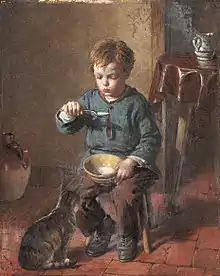William Hemsley | |
|---|---|
| Born | London |
| Died | 24 December 1906 (aged 89) London |
| Nationality | British |
| Known for | genre painting |
| Children | 3 |
William Hemsley RBA (London 1817[1] or 1819[2] – 24 December 1906[1] London) was a British artist who specialised in genre paintings.
Biography
William was born in London, the son of architect William Whitfield Hemsley (1796–1867) and Caroline Amelia Hemsley, née Jones (1797–1872). He was sent away to preparatory school in Brighton at a young age, and began to develop an interest in art through painting portraits as a teenager. Upon his return to London, he began to train in his father's profession and found employment as a drawing clerk in the office of John Crake.[1] However, he continued to be drawn to art, and left early in his career in order to paint professionally. He began to exhibit at artistic societies, and his works were regularly reviewed in The Art Journal. Hemsley's technique was compared to the Dutch style,[3][4] but attention was also drawn to his "love for fun."[5] Many of his works depicted rustic domestic scenes, leading to him being described as "pre-eminently the painter of cottage life."[6]
In 1859, Hemsley was elected to the Society of British Artists, and served as the vice president of the organisation, which later became the Royal Society of British Artists (RBA), for many years. He was also a steward of the Artists' General Benevolent Institution.[7]
For most of his adult life, Hemsley resided in London, including at 5 Marlborough Street, and at addresses in Chelsea and South Kensington.[8] He also undertook numerous study trips abroad, including to France and Holland.[9] He died on 24 December 1906, aged 89, at the home of his youngest son in south London, Walter Howard Hemsley (d. 1912). He was buried at Brompton Cemetery in west London.
Exhibitions
Between the years of 1848 and 1880, Hemsley exhibited 120 works in major London exhibitions, at the Royal Academy, the British Institute and the Society of British Artists' Suffolk Street gallery.[10] A number of his paintings were featured at the 1862 International Exhibition[2] and the Exposition universelle de 1867,[11] world's fairs held in London and Paris respectively, as well as at other British galleries including Manchester Art Gallery and Liverpool's Walker Art Gallery. Prints, usually wood-engravings, after his paintings appeared in the Illustrated London News,[12] Illustrated News of the World,[13] and The Art Journal.[14]
Today, Hemsley's paintings can be found at the Wellcome Library in London, and as part of public collections in Bath, Birkenhead, Hull, Leeds, Southport, and Wolverhampton.[15]
Selected paintings
 A Sham
A Sham Divided Attention
Divided Attention Porridge
Porridge The Young Dentist
The Young Dentist The Young Poacher
The Young Poacher
References
- 1 2 3 Who Was Who, 1897-1916. A & C Black Limited. 1920. p. 329.
- 1 2 Ottley, Henry; Bryan, Michael (1876). A biographical and critical dictionary of recent and living painters and engravers. London: G. Bell. p. 87.
- ↑ "The Art Journal". Vol. 29. 1867. p. 124.
- ↑ "The Art Journal". Vol. 33. 1871. p. 27.
- ↑ "The Art Journal". Vol. 26. 1864. p. 152.
- ↑ "The Art Journal". Vol. 28. 1864. p. 70.
- ↑ "The Athenaeum". No. 1430. London. 24 March 1855. p. 337.
- ↑ Graves, Algernon (1905). The Royal Academy of Arts; a complete dictionary of contributors and their work from its foundation in 1769 to 1904. p. 64. OCLC 2099022.
- ↑ Thieme, Ulrich; Becker, Felix (1923). Allgemeines Lexikon der bildenden Künstler von der Antike bis zur Gegenwart. Vol. 16. p. 371. OCLC 493507033.
- ↑ Graves, Algernon (1884). A dictionary of artists who have exhibited works in the principal London exhibitions of oil paintings from 1760-1880. London: G. Bell. p. 113.
- ↑ Paris Universal Exhibition of 1867: Catalogue of the British Section. Spottiswoode and Co. 1867. p. 31.
- ↑ "British Museum: Crab-catchers, after William Hemsley".
- ↑ "British Museum: Hook My Frock, after William Hemsley".
- ↑ "British Museum: Left in Charge, after William Hemsley".
- ↑ Wright, Christopher; Gordon, Catherine May; Smith, Mary Peskett (2006). British and Irish Paintings in Public Collections. New Haven: Yale University Press. p. 409. ISBN 0300117302.
External links
- 7 artworks by or after William Hemsley at the Art UK site
- William Hemsley at Suffolk Painters
- William Hemsley at All Things Victorian